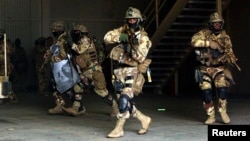The deputy speaker of parliament, Haider al-Abadi, said in a tweet that a grouping of Shi'ite parties is close to nominating a new prime minister as pressure has risen on current PM Nouri al-Maliki to step down.
Abadi's comments came after police sources said special forces and Shi'ite militias personally loyal to Maliki had been deployed in strategic areas of Baghdad after he made a defiant speech on television suggesting he would not cave in to pressure to drop his bid to stay in office following a parliamentary election held in April.
Abadi is seen as a possible successor to Maliki, who has been premier since 2006 but has alienated some allies, including the United States, who blame him for failing to forge consensus and so fuelling sectarian violence that is breaking Iraq apart.
In his tweet, Abadi said government forces were moving around the capital in anticipation of security breaches. Police set up checkpoints at major intersections, some with armored vehicles, and many roads were closed.
Maliki accused Iraqi President Fouad Masoum, from the ethnic Kurdish minority, of violating the constitution by missing a deadline for him to ask the biggest political bloc in the new legislature to nominate a prime minister and form a government.
The U.S. State Department said the United States is "closely monitoring" the unfolding events and "fully supports" President Massoum, who was elected president by parliament late last month.
Spokeswoman Marie Harf also said U.S. officials have been in contact with Iraqi leaders. She voiced "support for a process" to select a prime minister, and said Washington "stands ready to support a new and inclusive government."
Serving in a caretaker capacity since the inconclusive election in April, Maliki has defied calls by Sunnis, Kurds, some fellow Shi'ites, regional power broker Iran and Iraq's top cleric to step aside for a less polarizing figure.
Critics accuse Maliki of pursuing a sectarian agenda which has sidelined minority Sunni Muslims and prompted some of them to support Islamic State militants, whose latest sweep through northern Iraq has alarmed the Baghdad government and its Western allies, prompting U.S. air strikes in recent days.
“Maliki knows it is very difficult to gain a third term and is playing a high-stakes game to try and ensure his authority and influence continue into the new government, despite who may officially become prime minister,” said Kamran Bokhari, a Middle East specialist at analysis firm Stratfor.
Maliki under fire
Washington seems to be losing patience with Maliki, who has placed Shi'ite political loyalists in key positions in the army and military and drawn comparisons with executed former dictator Saddam Hussein, the man he plotted against from exile for years.
President Obama has urged Iraqi politicians to form a more inclusive government that can counter the growing threat from the Islamic State.
But Maliki, an unknown when he first took office in 2006 with help from the United States, is digging in.
“Now we can see unprecedented deployment of army commandos and special elite forces deployed in Baghdad, especially sensitive areas close to the green zone and the entrances of the capital,” one of the police sources said. “These forces are now taking full responsibility of securing these areas of the capital.”
Iraq's Interior Ministry has told police to be on high alert in connection with Maliki's speech, a police official told Reuters.
More U.S. air strikes
The Islamic State has capitalized on the political deadlock and sectarian tensions, making fresh gains after arriving in the north of the country in June from Syria.
The group, which sees Iraq's majority Shi'ites as infidels who deserve to be killed, has ruthlessly moved through one town after another, using tanks and heavy weapons it seized from soldiers who have fled in their thousands.
Islamic State militants have killed hundreds of Iraq's minority Yazidis, burying some alive and taking women as slaves, an Iraqi government minister said on Sunday, as U.S. warplanes again bombed the insurgents.
Human rights minister Mohammed Shia al-Sudani accused the Sunni Muslim militants - who have ordered the community they regard as “devil worshippers” to convert to Islam or die - of celebrating what he called a “a vicious atrocity.”
No independent confirmation was available of the killings. Thousands of Yazidis have taken refuge in the past week on the arid heights of Mount Sinjar, close to the Syrian border.
The bloodshed could increase pressure on Western powers to do more to help tens of thousands of people, including many from religious and ethnic minorities, who have fled the Islamic State's offensive.
The U.S. Central Command said drones and jet aircraft had hit Islamic State armed trucks and mortar positions near Erbil, the capital of the autonomous Kurdish region which had been relatively stable throughout the past decade until insurgents swept across northwestern Iraq this summer.
That marked a third successive day of U.S. air strikes. Central Command said that they were aimed at protecting Kurdish peshmerga forces as they face off against the militants near Erbil, the site of a U.S. consulate and a U.S.-Iraqi joint military operations center.
The Islamists' advance in the past week has forced tens of thousands to flee, threatened Erbil and provoked the first U.S. attacks since Washington withdrew troops from Iraq in late 2011, nearly nine years after invading to oust Saddam Hussein.
Some material in this report was contributed by Reuters.








